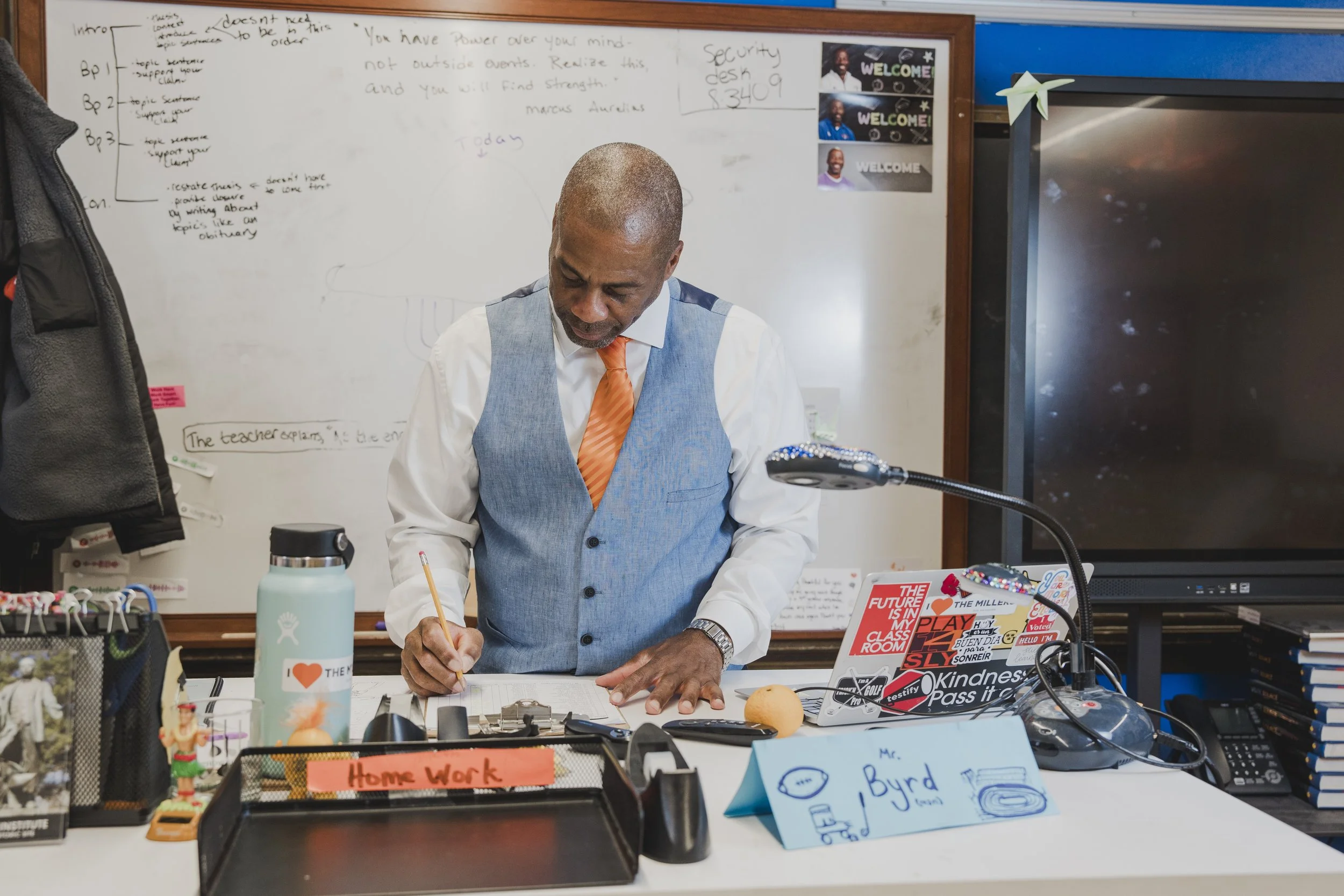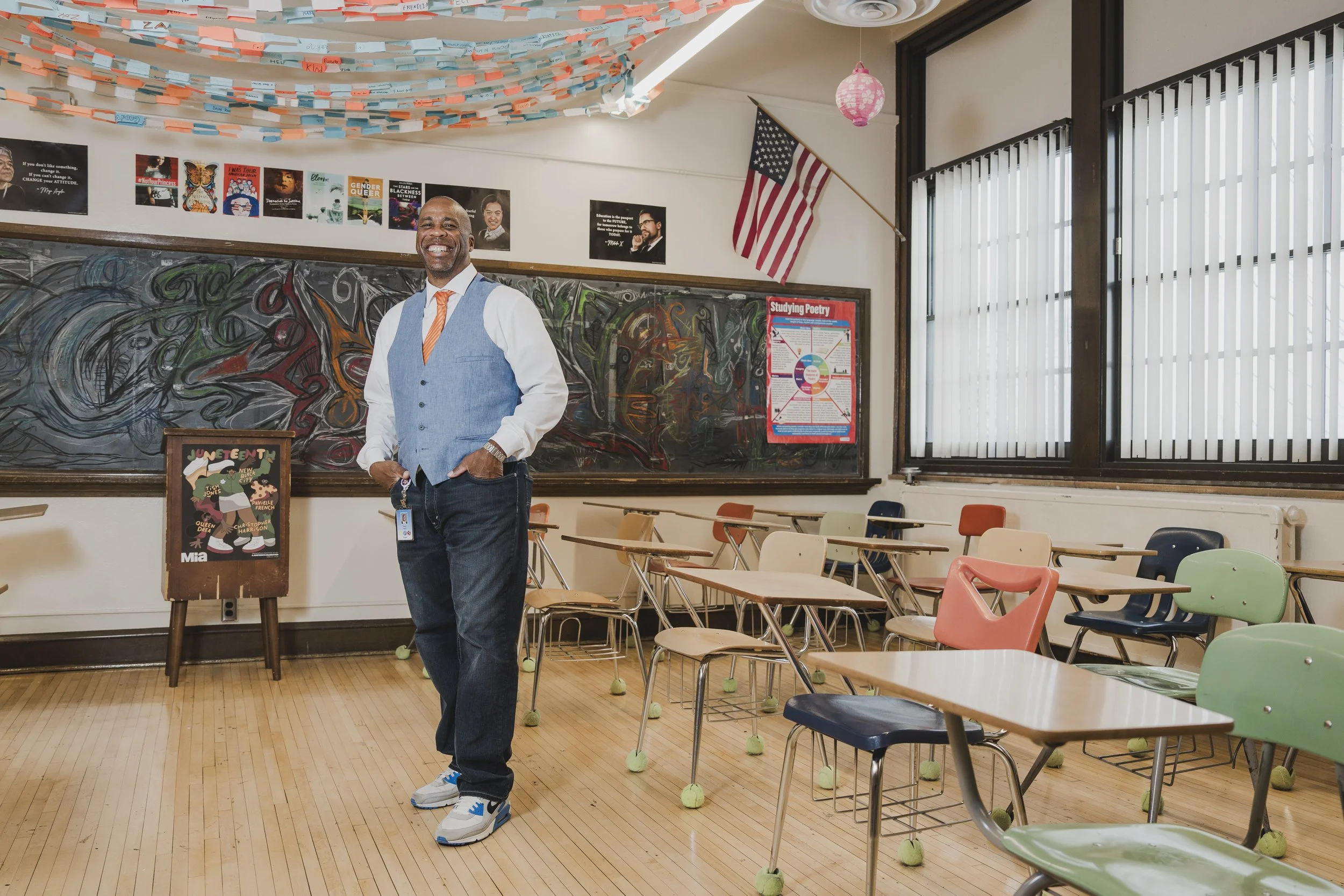Teaching Is Legacy: Tracy Byrd’s Inspiring Journey From Finance to Education
Teaching isn’t just about individual success—it’s about growing together as a community
Tracy Byrd in his Washburn classroom
Tracy Byrd’s path to becoming Minnesota Teacher of the Year 2024 is anything but conventional. As a ninth-grade English teacher at Washburn High School in Minneapolis since 2017, Tracy’s journey weaves through a reluctant childhood relationship with school, a career in finance, and an unexpected leap into education. What started as a hall-monitor position evolved into a calling to teach, mentor, and inspire.
From a kid who doesn’t like school to an educator, from the financial field to education, what’s your journey as a teacher?
Tracy Byrd: I never saw myself as a teacher because I always thought teachers were the ones with all the right answers, constantly correcting everyone — and that wasn’t me. Honestly, I just wanted to get in and out of the classroom as quickly as possible. When I was at Washburn, I’d tell students, “There’s very little you can think of doing that I haven’t already done.” I knew all the nooks and crannies of the school, where people hung out, so I could catch them. They couldn’t get away with anything.
When I left my job at Piper Jaffray and started working at a school, I thought, I’m gonna be a hall monitor forever. This is great! I got to work in the halls, talk to people, and tell stories. But then one of the principals said, “No, you’re going to be a teacher.” I was like, “Wait, you have to get a degree to be a teacher? I don’t do school. I just don’t.” But they said, “Yes, you do.”
At first, it was literally survival mode—getting through each day without letting the children eat me alive. I had to learn to conduct myself as a professional and establish the reality that 'I’m the one teaching, and they’re the ones learning.'
In the business sector, there's right and wrong, and things need to be done immediately. In education, it’s different. It’s not life or death, so I learn to offer more grace. I’ve learned to be more flexible and patient with students' learning processes. I remember a senior who, as a freshman, was disruptive. But by the third quarter, after reading Romeo and Juliet, they became involved in school plays and musicals. It was amazing to see how they found their voice. It’s not about if they’ll get it, but when—and my job is to shorten that gap. My title is a ninth-grade teacher, but I see myself as a 'dream manager.' It’s about helping students discover their aspirations and creating pathways to achieve them.
How has teamwork impacted you as a teacher?
Tracy Byrd: A frog doesn’t get on a fence post by itself. I wouldn’t be able to do what I do without my colleagues. Working with colleagues like Jason Jirsa has been invaluable. I’ve learned a lot from his teaching approach; the students develop face-to-face communication skills while studying social science through Model UN. I always strive to be a better version of myself for my students, and I draw inspiration from the teachers around me. They’ve taught me that teaching isn’t just about individual success—it’s about growing together as a community.
“My title is a ninth-grade teacher, but I see myself as a ‘dream manager.’ It’s about helping students discover their aspirations and creating pathways to achieve them.”
In addition to being an educator, you're also a coach and a mentor. How do these roles compliment each other in helping students reach their potential?
Tracy Byrd: It’s about using different communication frequencies. Some students love clear directions, so I put on my coaching hat and grab my whistle. Some prefer conversation, so I become the mentor and we talk it through.
Since the Pandemic, I realized that many students were missing foundational knowledge. Going forward, I’m here to prepare them for 9th or 10th grade. I call it the conveyor belt of society. Step by step, it becomes more manageable. Just as our track and field shirts say, “Process is greater than outcome”. It's all about the process. It’s teaching through mentoring and coaching.
What do you hope to see in the future of public education?
Tracy Byrd: The access needs to be there for everyone, especially for students from underserved populations. Many of them come from families with negative experiences in education, so there’s also a need to educate parents. In some cultures, people don’t talk about their problems, but sharing information is key to unlocking resources for success. I only have my students for one hour a day, but there needs to be a larger support system that involves families.
Expose students to more careers. I tell them, 'You probably didn’t know this job existed, but now you do. Imagine all the other jobs out there you haven’t heard of.' Then I push them to dream big. I ask them to think of something they’d do for free—no entertainment or sports—and we work backwards to figure out the steps to make it a reality by ninth grade. It’s about building confidence and curiosity, helping them dream bigger than what they see around them. Even though I only have them for an hour, that hour counts. It’s about making an impact, whether through one conversation or a moment that helps them see a bigger picture.
As the 2024 Minnesota Teacher of the Year, what legacy do you hope to leave for your students and colleagues?
Tracy Byrd: One of the biggest reasons I stayed in teaching was my parents. My mom did part-time community college, and my dad didn’t even finish high school—he came from that generation where you had to start working early. I’m a student from South Minneapolis who was kicked out and dropped out of college multiple times. Knowing what my parents went through and how far I’ve come from that, I want people to know that anything is possible, as long as you’re intentional with what you want. I couldn’t believe it when they called my name as Teacher of the Year. But they called my name!
Personal growth is my goal — how do I become a better version of myself every day and push my students to do the same? Because I was once a student who didn’t like school, and now here I am, trying to lead by example. I’m trying to teach a message that everyone can change being intentional with your time and decisions.
What advice would you give to those considering teaching as a second career?
Tracy Byrd: Go for it! All skills are transferable. So whatever you've learned in your insurance, medical or culinary fields, all of these will translate to the classroom. And these are experiences that the students are looking for.
So if you're thinking about jumping into education, come on! There’s no secret sauce. It’s not just me—you can do this too!
“Even though I only have them for an hour, that hour counts. It’s about making an impact, whether through one conversation or a moment that helps them see a bigger picture.”




